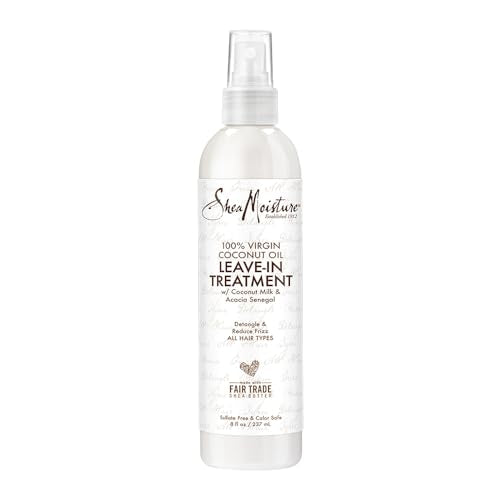
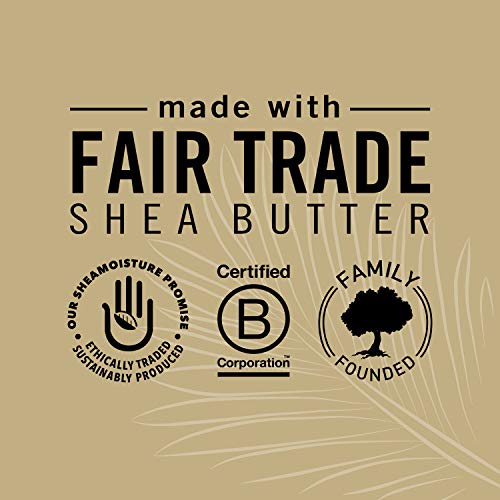
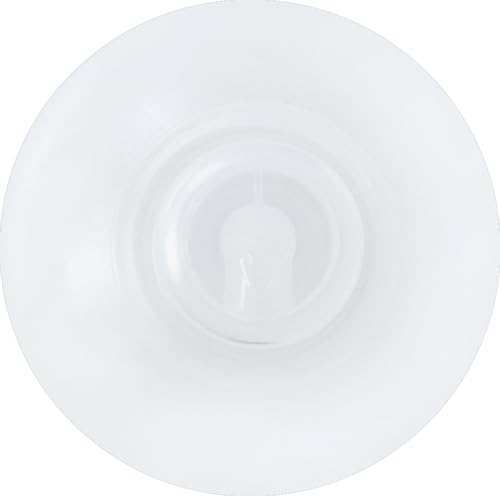
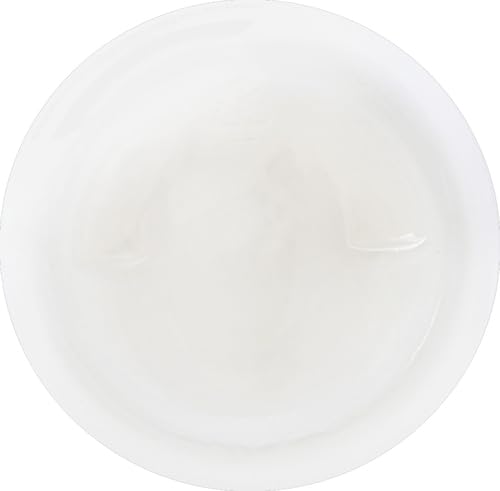
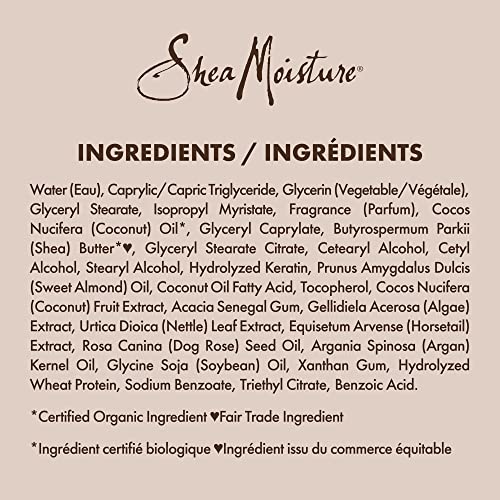
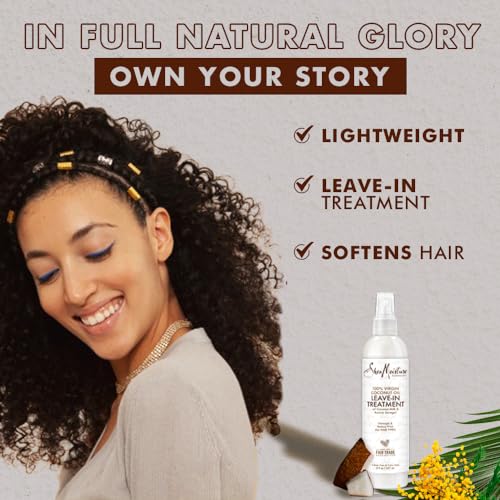

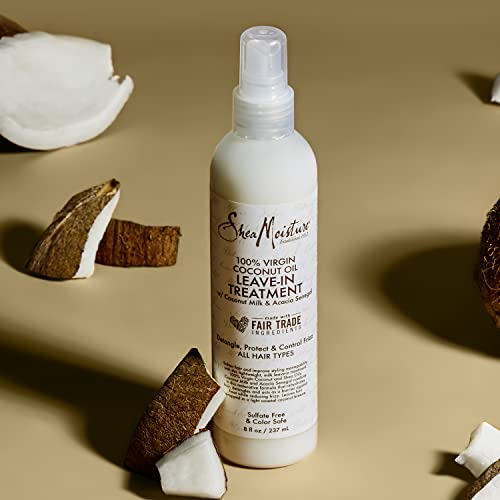

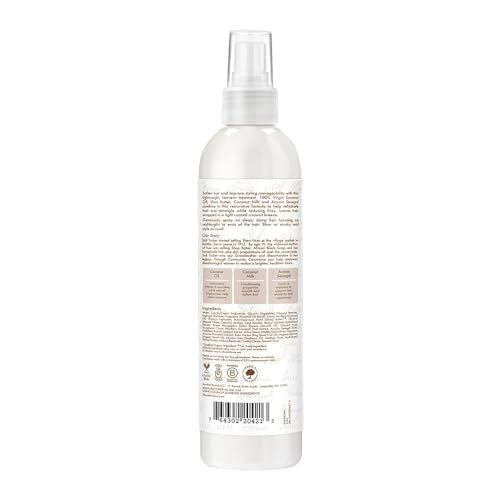
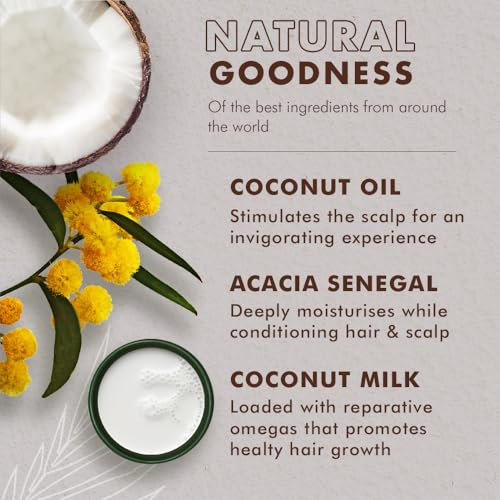
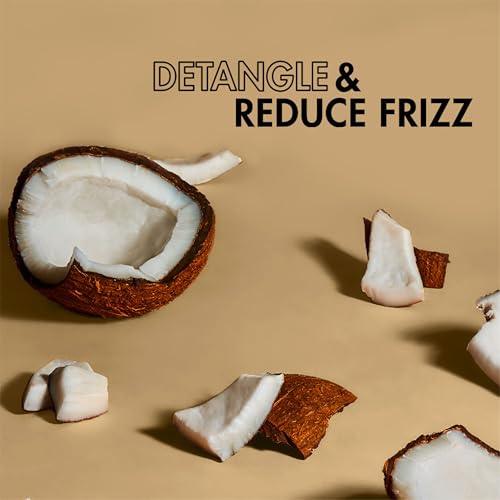
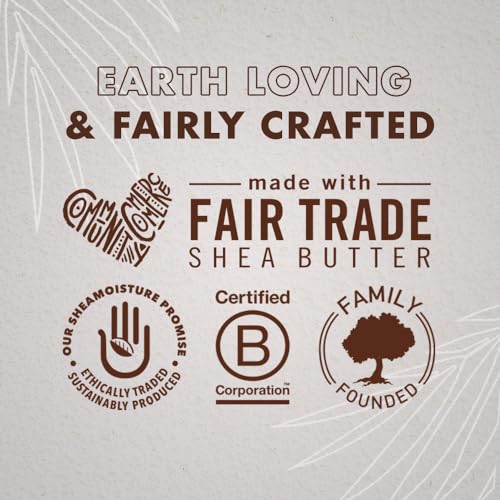
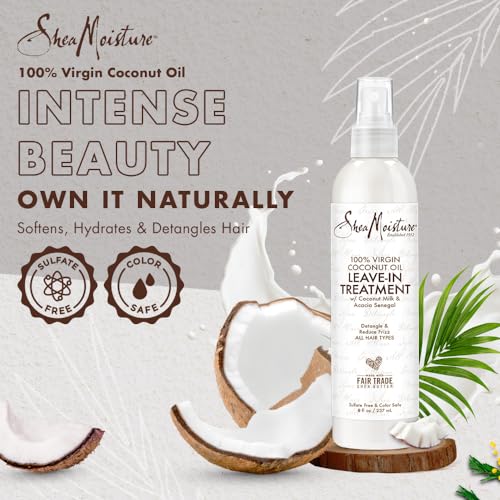
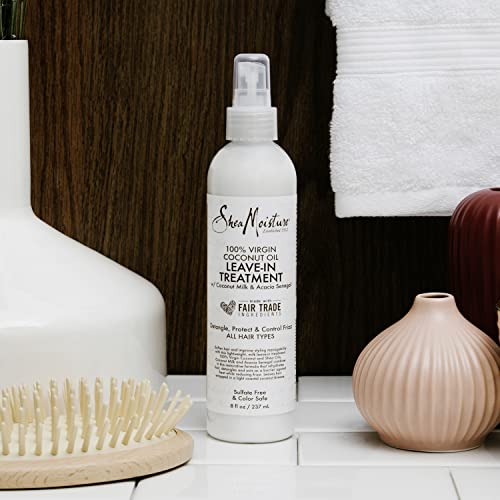
SheaMoisture Leave-in Conditioner - Softens & Detangles, Silicone-Free, 8oz with Coconut Oil


Fragrance
High RiskFragrance refers to a mixture of aromatic compounds used in products to provide scent. It is commonly listed as 'fragrance' or 'parfum' on product labels and can serve various functions, including enhancing user experience and masking undesirable odors.
Sustai Insights
Fragrance offers functional benefits by improving product appeal; however, it poses significant health risks, notably a high likelihood of causing allergies and allergic contact dermatitis. Environmental risks include potential pollution and endocrine disruption, though its overall carcinogenicity is low. Regulatory bodies have noted concerns regarding its use, leading to a high-risk classification. Safe usage practices should be observed, and alternatives such as natural essential oils are recommended for those sensitive to synthetic fragrances.
Cetrimonium Chloride
High RiskCetrimonium chloride is a quaternary ammonium compound commonly used in personal care products as a conditioning agent and emulsifier. It aids in improving the texture and manageability of hair and skin, serving as a surfactant that reduces surface tension.
Sustai Insights
Cetrimonium chloride provides functional benefits as an effective conditioning agent, enhancing product performance. However, it poses moderate health risks, including potential allergenic reactions and irritation, while being classified with high usage restrictions by regulatory authorities. Environmental concerns include its status as a pollutant with potential bioaccumulative effects. Overall, the ingredient presents a high risk level, necessitating cautious usage and consideration of safer alternatives.
Glyceryl Undecylenate
Medium RiskGlyceryl undecylenate is an ester of glycerin and undecylenic acid, commonly used as a skin-conditioning agent and emulsifier in cosmetic formulations. It aids in improving the texture and spreadability of products, contributing to their overall performance.
Sustai Insights
Glyceryl undecylenate offers functional benefits as an effective emulsifier and skin-conditioning agent. It is generally recognized as safe with low concerns regarding carcinogenicity, allergies, and reproductive toxicity. However, moderate use restrictions exist, and regulatory advisories should be considered. Environmental risks are minimal, with no significant pollutant or bioaccumulation potential noted. Overall, the risk assessment indicates a medium-level risk, making it essential to follow safe usage practices and consider alternatives like glycerin or natural oils for sustainability.
Hydrolyzed Vegetable Protein Pg Propyl Silanetriol
Low RiskHydrolyzed vegetable protein PG-propyl silanetriol is a modified protein derived from vegetable sources, used in cosmetic formulations primarily for its conditioning properties. It acts as a moisturizing agent and film-forming agent, enhancing the texture and feel of products.
Sustai Insights
Hydrolyzed vegetable protein PG-propyl silanetriol offers functional benefits as a moisturizing and conditioning agent in personal care products. It is considered low risk for health concerns, with minimal evidence of carcinogenicity, allergies, or reproductive toxicity. Environmentally, it poses low pollutant and bioaccumulation risks, with no current regulatory restrictions. Safe usage practices involve adhering to product guidelines, and while alternatives exist, they may not replicate all functional benefits. Overall, this ingredient is assessed as low risk based on current scientific consensus.
Hydrolyzed Keratin
Low RiskHydrolyzed keratin is a hydrolysate of keratin, a fibrous protein found in hair, skin, and nails. It is commonly used in cosmetic and personal care products to improve texture and strength, providing conditioning and moisturizing benefits to hair and skin.
Sustai Insights
Hydrolyzed keratin offers functional benefits as a conditioning agent, enhancing the texture and strength of hair and skin, and is often sourced sustainably. Health risks are low, with no significant concerns regarding carcinogenicity or irritancy. Environmental impacts are minimal, and regulatory bodies impose few restrictions. Overall, the risk level is assessed as low, and safe usage practices are recommended. Alternatives like plant-based proteins may offer similar benefits in a more sustainable manner.
Urtica Dioica (Nettle) Leaf Extract
Low RiskUrtica dioica, commonly known as nettle leaf extract, is derived from the leaves of the nettle plant. It is often used in cosmetic and personal care products for its potential soothing and anti-inflammatory properties. Nettle extract is recognized for its role as a botanical extract in formulations.
Sustai Insights
Nettle leaf extract offers functional benefits such as skin soothing and anti-inflammatory effects, contributing positively to product efficacy. It is considered low risk in terms of health impacts, with no significant concerns for carcinogenicity, allergies, or reproductive toxicity. Environmentally, it does not contribute substantially to pollution or bioaccumulation. Regulatory bodies have not flagged it for restrictions, indicating a favorable compliance status. Overall, the ingredient scores low on the risk scale, making it a suitable option in various formulations. Safe usage practices involve following product guidelines, and alternatives can be explored for enhanced sustainability.
Tocopherol, D Alpha
Low RiskTocopherol, specifically d-alpha tocopherol, is a naturally occurring form of Vitamin E. It is commonly used in cosmetic and personal care products primarily for its antioxidant properties, helping to protect formulations from oxidation and extend shelf life.
Sustai Insights
D-alpha tocopherol provides effective antioxidant benefits, contributing to product stability. It is sustainably sourced and generally regarded as safe, with low concerns regarding carcinogenicity, allergies, and reproductive toxicity. However, there are minor concerns about endocrine disruption. Regulatory bodies have not imposed significant restrictions, indicating low overall risk. Recommended usage practices include adhering to established safe concentration thresholds. Alternatives, such as other forms of Vitamin E or plant-based antioxidants, may also be considered.
Cocos Nucifera (Coconut) Oil
Low RiskCocos Nucifera (Coconut) Oil is derived from the kernels of the coconut palm. It is primarily used in cosmetic formulations for its emollient and moisturizing properties, making it suitable for skin and hair care products.
Sustai Insights
Coconut oil serves as an effective moisturizer and emollient, promoting skin hydration and softness. It is sustainably sourced and biodegradable. Health risks are minimal, with low concerns regarding carcinogenicity, allergens, and reproductive toxicity. Environmental impact is also low, as it does not contribute significantly to pollution or bioaccumulation. Regulatory bodies have not issued restrictions on its use. Overall, coconut oil presents a low risk for health and environmental concerns, making it a safe ingredient in cosmetic products.
Glyceryl Stearate Citrate
Low RiskGlyceryl stearate citrate is a citric acid ester of glycerol and stearic acid, commonly used as an emulsifier and stabilizer in cosmetic formulations. It helps blend oil and water components, enhancing product texture and consistency.
Sustai Insights
Glyceryl stearate citrate offers functional benefits as an effective emulsifier, improving product stability and texture. It is considered safe, with low concerns for cancer, allergies, and reproductive toxicity. However, it may cause skin irritation in some individuals. Environmental risks are minimal, with no significant bioaccumulation or pollutant potential. Regulatory bodies have not placed significant restrictions on its use. Overall, the ingredient is assessed as low risk, with safe usage practices recommended, and alternatives may include other emulsifiers like cetearyl alcohol.
Rosa Canina (Dog Rose) Fruit Oil
Low RiskRosa canina (dog rose) fruit oil is derived from the fruit of the dog rose plant. It is commonly used in cosmetics for its emollient properties, helping to moisturize and soothe the skin. Additionally, it may contain bioactive compounds that contribute to its potential skin benefits.
Sustai Insights
Rosa canina fruit oil offers functional benefits as a moisturizer and skin conditioner, with sustainable sourcing potential. Health risks are low, with minimal concerns regarding carcinogenicity, allergies, or reproductive toxicity. Environmental risks are also low, with no significant pollutant potential. Regulatory agencies do not list it under restrictions, indicating its safety for use. Overall, the risk level is assessed as low, making it a suitable ingredient for cosmetic formulations.
Glyceryl Caprylate
Low RiskGlyceryl caprylate is a monoester of glycerin and caprylic acid, commonly used in cosmetics and personal care products as an emulsifier and skin-conditioning agent. It helps stabilize formulations and improve the texture and feel on the skin.
Sustai Insights
Glyceryl caprylate offers functional benefits as an effective emulsifier and skin-conditioning agent, enhancing product performance. It is biodegradable and considered sustainably sourced. Health risks are low, with minimal concerns regarding carcinogenicity, allergenic potential, and endocrine disruption. Environmental risks are also low, with no significant pollutant or bioaccumulation potential identified. Regulatory status is favorable, with no major restrictions. Overall, glyceryl caprylate maintains a low risk profile, making it a suitable ingredient for use in cosmetic formulations.
Coconut Fatty Acid
Low RiskCoconut fatty acid is a mixture of fatty acids derived from coconut oil, primarily composed of caprylic and capric acids. It is commonly used in cosmetic formulations for its emollient properties, helping to moisturize and soften the skin.
Sustai Insights
Coconut fatty acid serves as an effective emollient, enhancing skin hydration and texture. It is considered to have low health risks, with minimal concerns regarding carcinogenicity, allergenic potential, and reproductive toxicity. Environmentally, it is not recognized as a pollutant or bioaccumulative. Regulatory bodies do not impose significant restrictions on its use. Overall, the ingredient poses low risk, and its safe application in cosmetic products is supported by its favorable profile.
Equisetum Arvense (Horsetail) Extract
Low RiskEquisetum arvense extract is derived from the horsetail plant, known for its high silica content. It is commonly used in cosmetic formulations for its potential benefits in promoting healthy skin and hair, as well as its role as a natural preservative due to its antioxidant properties.
Sustai Insights
Equisetum arvense extract offers functional benefits including enhancing skin and hair health through its silica content and antioxidant properties. It is sustainably sourced and biodegradable. Health risks are minimal, with low concerns for carcinogenicity, allergies, and reproductive toxicity. Environmental risks are also low, with no significant pollutant or bioaccumulative effects noted. Regulatory bodies do not list this ingredient as restricted. Overall, the risk level is assessed as low, making it a safe option in cosmetic products.
Cetearyl Alcohol
Low RiskCetearyl alcohol is a mixture of cetyl and stearyl alcohol, primarily used as an emulsifier and thickener in cosmetic formulations. It helps stabilize products, improve texture, and enhance moisturizing properties, making it common in creams and lotions.
Sustai Insights
Cetearyl alcohol offers functional benefits as an effective emulsifier and skin-conditioning agent, contributing to product stability and texture. It is generally recognized as safe, with low concerns for carcinogenicity, allergies, or reproductive toxicity. Environmental risks are minimal, as it is biodegradable and has low pollutant potential. Regulatory bodies have not imposed significant restrictions on its use. Overall, cetearyl alcohol is assessed to carry low risk, making it a suitable ingredient choice in cosmetic products.
Argania Spinosa (Argan) Kernel Oil
Low RiskArgania spinosa (argan) kernel oil is a fixed oil extracted from the kernels of the argan tree, native to Morocco. It is commonly used in cosmetic formulations for its moisturizing properties, serving as an emollient and skin conditioner.
Sustai Insights
Argania spinosa kernel oil offers functional benefits such as effective hydration and nourishment for the skin and hair. It is sustainably sourced and biodegradable, contributing positively to environmental considerations. Health risks are low, with minimal concerns regarding carcinogenicity, allergies, or reproductive toxicity. There are no current regulatory restrictions on its use. Overall, it poses low risk, making it a suitable ingredient in cosmetic products. Safe usage practices should be maintained, and alternatives like jojoba oil may also be considered for similar benefits.
Acacia Senegal Gum Extract
Low RiskAcacia senegal gum extract is an extract derived from the gum of the Acacia senegal tree, commonly used in cosmetics for its thickening and emulsifying properties. It serves to stabilize formulations and improve texture without imparting strong scents or colors.
Sustai Insights
Acacia senegal gum extract offers functional benefits as an effective emulsifier and stabilizer in cosmetic formulations, supporting product texture and stability. It is considered low risk for health concerns such as carcinogenicity, allergies, and developmental toxicity, with no significant environmental hazards reported. Regulatory status indicates no widespread restrictions. Overall, it presents a low risk profile, making it a favorable choice in cosmetic applications.
Water
Low RiskWater is a clear, colorless liquid essential for various biological processes. It serves as a solvent in formulations, facilitating the dissolution of other ingredients and enhancing product texture and application. Additionally, water plays a crucial role in hydration and is a key component in many cosmetic and personal care products.
Sustai Insights
Water is an effective solvent and hydrator, contributing to the texture and efficacy of formulations. It is biodegradable and generally regarded as safe, with low concerns regarding carcinogenicity, allergies, and reproductive toxicity. However, excessive water usage can lead to environmental concerns, particularly regarding resource depletion. Regulatory bodies do not impose restrictions on water use in cosmetics. Overall, the risks associated with water are low, making it a safe and essential ingredient.
Corylus (Hazelnut) Oil
Low RiskCorylus (hazelnut) oil is derived from the nuts of the hazel tree. It is primarily used in cosmetic and skincare products for its emollient properties, providing moisture and enhancing skin texture. The oil is rich in fatty acids and vitamins, contributing to its function as a skin conditioning agent.
Sustai Insights
Corylus (hazelnut) oil offers functional benefits as a moisturizer and skin conditioner while being biodegradable and potentially sustainably sourced. Health risks are low, with minimal concerns related to carcinogenicity, allergenic potential, or reproductive toxicity. Environmental impacts are also low, with no known bioaccumulation issues. Regulatory status shows no restrictions. Overall, the ingredient is assessed as low risk, with safe usage practices recommended and no significant alternatives noted.
Caprylic Triglyceride
Low RiskCaprylic triglyceride is an ester derived from coconut oil and glycerin, commonly used in cosmetic formulations as an emollient, stabilizer, and skin-conditioning agent. It helps to improve the texture and spreadability of products while providing a lightweight, non-greasy feel.
Sustai Insights
Caprylic triglyceride offers functional benefits such as enhanced skin moisturization and improved formulation stability. It is generally regarded as safe, with low concerns regarding carcinogenicity, allergenic potential, and reproductive toxicity. Environmental impact is minimal, with no significant pollutant or bioaccumulative properties identified. Regulatory bodies have not issued warnings or restrictions. Overall, the risk level is low, making it a suitable ingredient in cosmetic products. Safe usage practices include adhering to recommended concentrations, and while there are alternatives, caprylic triglyceride remains a reliable choice.
Butyrospermum Parkii (Shea) Butter
Low RiskButyrospermum parkii (shea) butter is a vegetable fat derived from the nuts of the shea tree. It is commonly used in cosmetic formulations for its emollient properties, providing moisture and improving skin texture. Additionally, shea butter is known for its ability to enhance the stability of products and deliver a creamy texture.
Sustai Insights
Shea butter offers functional benefits as an effective moisturizer, enhancing skin barrier function and texture. It is sustainably sourced and biodegradable, contributing to eco-friendliness. Health-wise, it is associated with low risks for carcinogenicity, allergies, and reproductive toxicity. Environmental impacts are minimal, with no significant pollutant potential identified. Regulatory assessments indicate no current restrictions. Overall, the ingredient presents a low risk, making it a favorable choice in cosmetic formulations.
Hydrolyzed Vegetable Protein Pg Propyl Silanetriol
Low RiskHydrolyzed vegetable protein PG-propyl silanetriol is a modified protein derived from vegetable sources, used in cosmetic formulations primarily for its conditioning properties. It acts as a moisturizing agent and film-forming agent, enhancing the texture and feel of products.
Sustai Insights
Hydrolyzed vegetable protein PG-propyl silanetriol offers functional benefits as a moisturizing and conditioning agent in personal care products. It is considered low risk for health concerns, with minimal evidence of carcinogenicity, allergies, or reproductive toxicity. Environmentally, it poses low pollutant and bioaccumulation risks, with no current regulatory restrictions. Safe usage practices involve adhering to product guidelines, and while alternatives exist, they may not replicate all functional benefits. Overall, this ingredient is assessed as low risk based on current scientific consensus.
Hydrolyzed Keratin
Low RiskHydrolyzed keratin is a hydrolysate of keratin, a fibrous protein found in hair, skin, and nails. It is commonly used in cosmetic and personal care products to improve texture and strength, providing conditioning and moisturizing benefits to hair and skin.
Sustai Insights
Hydrolyzed keratin offers functional benefits as a conditioning agent, enhancing the texture and strength of hair and skin, and is often sourced sustainably. Health risks are low, with no significant concerns regarding carcinogenicity or irritancy. Environmental impacts are minimal, and regulatory bodies impose few restrictions. Overall, the risk level is assessed as low, and safe usage practices are recommended. Alternatives like plant-based proteins may offer similar benefits in a more sustainable manner.
Urtica Dioica (Nettle) Leaf Extract
Low RiskUrtica dioica, commonly known as nettle leaf extract, is derived from the leaves of the nettle plant. It is often used in cosmetic and personal care products for its potential soothing and anti-inflammatory properties. Nettle extract is recognized for its role as a botanical extract in formulations.
Sustai Insights
Nettle leaf extract offers functional benefits such as skin soothing and anti-inflammatory effects, contributing positively to product efficacy. It is considered low risk in terms of health impacts, with no significant concerns for carcinogenicity, allergies, or reproductive toxicity. Environmentally, it does not contribute substantially to pollution or bioaccumulation. Regulatory bodies have not flagged it for restrictions, indicating a favorable compliance status. Overall, the ingredient scores low on the risk scale, making it a suitable option in various formulations. Safe usage practices involve following product guidelines, and alternatives can be explored for enhanced sustainability.
Tocopherol, D Alpha
Low RiskTocopherol, specifically d-alpha tocopherol, is a naturally occurring form of Vitamin E. It is commonly used in cosmetic and personal care products primarily for its antioxidant properties, helping to protect formulations from oxidation and extend shelf life.
Sustai Insights
D-alpha tocopherol provides effective antioxidant benefits, contributing to product stability. It is sustainably sourced and generally regarded as safe, with low concerns regarding carcinogenicity, allergies, and reproductive toxicity. However, there are minor concerns about endocrine disruption. Regulatory bodies have not imposed significant restrictions, indicating low overall risk. Recommended usage practices include adhering to established safe concentration thresholds. Alternatives, such as other forms of Vitamin E or plant-based antioxidants, may also be considered.
Cocos Nucifera (Coconut) Oil
Low RiskCocos Nucifera (Coconut) Oil is derived from the kernels of the coconut palm. It is primarily used in cosmetic formulations for its emollient and moisturizing properties, making it suitable for skin and hair care products.
Sustai Insights
Coconut oil serves as an effective moisturizer and emollient, promoting skin hydration and softness. It is sustainably sourced and biodegradable. Health risks are minimal, with low concerns regarding carcinogenicity, allergens, and reproductive toxicity. Environmental impact is also low, as it does not contribute significantly to pollution or bioaccumulation. Regulatory bodies have not issued restrictions on its use. Overall, coconut oil presents a low risk for health and environmental concerns, making it a safe ingredient in cosmetic products.
Glyceryl Stearate Citrate
Low RiskGlyceryl stearate citrate is a citric acid ester of glycerol and stearic acid, commonly used as an emulsifier and stabilizer in cosmetic formulations. It helps blend oil and water components, enhancing product texture and consistency.
Sustai Insights
Glyceryl stearate citrate offers functional benefits as an effective emulsifier, improving product stability and texture. It is considered safe, with low concerns for cancer, allergies, and reproductive toxicity. However, it may cause skin irritation in some individuals. Environmental risks are minimal, with no significant bioaccumulation or pollutant potential. Regulatory bodies have not placed significant restrictions on its use. Overall, the ingredient is assessed as low risk, with safe usage practices recommended, and alternatives may include other emulsifiers like cetearyl alcohol.
Fragrance
High RiskFragrance refers to a mixture of aromatic compounds used in products to provide scent. It is commonly listed as 'fragrance' or 'parfum' on product labels and can serve various functions, including enhancing user experience and masking undesirable odors.
Sustai Insights
Fragrance offers functional benefits by improving product appeal; however, it poses significant health risks, notably a high likelihood of causing allergies and allergic contact dermatitis. Environmental risks include potential pollution and endocrine disruption, though its overall carcinogenicity is low. Regulatory bodies have noted concerns regarding its use, leading to a high-risk classification. Safe usage practices should be observed, and alternatives such as natural essential oils are recommended for those sensitive to synthetic fragrances.
Rosa Canina (Dog Rose) Fruit Oil
Low RiskRosa canina (dog rose) fruit oil is derived from the fruit of the dog rose plant. It is commonly used in cosmetics for its emollient properties, helping to moisturize and soothe the skin. Additionally, it may contain bioactive compounds that contribute to its potential skin benefits.
Sustai Insights
Rosa canina fruit oil offers functional benefits as a moisturizer and skin conditioner, with sustainable sourcing potential. Health risks are low, with minimal concerns regarding carcinogenicity, allergies, or reproductive toxicity. Environmental risks are also low, with no significant pollutant potential. Regulatory agencies do not list it under restrictions, indicating its safety for use. Overall, the risk level is assessed as low, making it a suitable ingredient for cosmetic formulations.
Glyceryl Caprylate
Low RiskGlyceryl caprylate is a monoester of glycerin and caprylic acid, commonly used in cosmetics and personal care products as an emulsifier and skin-conditioning agent. It helps stabilize formulations and improve the texture and feel on the skin.
Sustai Insights
Glyceryl caprylate offers functional benefits as an effective emulsifier and skin-conditioning agent, enhancing product performance. It is biodegradable and considered sustainably sourced. Health risks are low, with minimal concerns regarding carcinogenicity, allergenic potential, and endocrine disruption. Environmental risks are also low, with no significant pollutant or bioaccumulation potential identified. Regulatory status is favorable, with no major restrictions. Overall, glyceryl caprylate maintains a low risk profile, making it a suitable ingredient for use in cosmetic formulations.
Coconut Fatty Acid
Low RiskCoconut fatty acid is a mixture of fatty acids derived from coconut oil, primarily composed of caprylic and capric acids. It is commonly used in cosmetic formulations for its emollient properties, helping to moisturize and soften the skin.
Sustai Insights
Coconut fatty acid serves as an effective emollient, enhancing skin hydration and texture. It is considered to have low health risks, with minimal concerns regarding carcinogenicity, allergenic potential, and reproductive toxicity. Environmentally, it is not recognized as a pollutant or bioaccumulative. Regulatory bodies do not impose significant restrictions on its use. Overall, the ingredient poses low risk, and its safe application in cosmetic products is supported by its favorable profile.
Equisetum Arvense (Horsetail) Extract
Low RiskEquisetum arvense extract is derived from the horsetail plant, known for its high silica content. It is commonly used in cosmetic formulations for its potential benefits in promoting healthy skin and hair, as well as its role as a natural preservative due to its antioxidant properties.
Sustai Insights
Equisetum arvense extract offers functional benefits including enhancing skin and hair health through its silica content and antioxidant properties. It is sustainably sourced and biodegradable. Health risks are minimal, with low concerns for carcinogenicity, allergies, and reproductive toxicity. Environmental risks are also low, with no significant pollutant or bioaccumulative effects noted. Regulatory bodies do not list this ingredient as restricted. Overall, the risk level is assessed as low, making it a safe option in cosmetic products.
Cetearyl Alcohol
Low RiskCetearyl alcohol is a mixture of cetyl and stearyl alcohol, primarily used as an emulsifier and thickener in cosmetic formulations. It helps stabilize products, improve texture, and enhance moisturizing properties, making it common in creams and lotions.
Sustai Insights
Cetearyl alcohol offers functional benefits as an effective emulsifier and skin-conditioning agent, contributing to product stability and texture. It is generally recognized as safe, with low concerns for carcinogenicity, allergies, or reproductive toxicity. Environmental risks are minimal, as it is biodegradable and has low pollutant potential. Regulatory bodies have not imposed significant restrictions on its use. Overall, cetearyl alcohol is assessed to carry low risk, making it a suitable ingredient choice in cosmetic products.
Argania Spinosa (Argan) Kernel Oil
Low RiskArgania spinosa (argan) kernel oil is a fixed oil extracted from the kernels of the argan tree, native to Morocco. It is commonly used in cosmetic formulations for its moisturizing properties, serving as an emollient and skin conditioner.
Sustai Insights
Argania spinosa kernel oil offers functional benefits such as effective hydration and nourishment for the skin and hair. It is sustainably sourced and biodegradable, contributing positively to environmental considerations. Health risks are low, with minimal concerns regarding carcinogenicity, allergies, or reproductive toxicity. There are no current regulatory restrictions on its use. Overall, it poses low risk, making it a suitable ingredient in cosmetic products. Safe usage practices should be maintained, and alternatives like jojoba oil may also be considered for similar benefits.
Acacia Senegal Gum Extract
Low RiskAcacia senegal gum extract is an extract derived from the gum of the Acacia senegal tree, commonly used in cosmetics for its thickening and emulsifying properties. It serves to stabilize formulations and improve texture without imparting strong scents or colors.
Sustai Insights
Acacia senegal gum extract offers functional benefits as an effective emulsifier and stabilizer in cosmetic formulations, supporting product texture and stability. It is considered low risk for health concerns such as carcinogenicity, allergies, and developmental toxicity, with no significant environmental hazards reported. Regulatory status indicates no widespread restrictions. Overall, it presents a low risk profile, making it a favorable choice in cosmetic applications.
Water
Low RiskWater is a clear, colorless liquid essential for various biological processes. It serves as a solvent in formulations, facilitating the dissolution of other ingredients and enhancing product texture and application. Additionally, water plays a crucial role in hydration and is a key component in many cosmetic and personal care products.
Sustai Insights
Water is an effective solvent and hydrator, contributing to the texture and efficacy of formulations. It is biodegradable and generally regarded as safe, with low concerns regarding carcinogenicity, allergies, and reproductive toxicity. However, excessive water usage can lead to environmental concerns, particularly regarding resource depletion. Regulatory bodies do not impose restrictions on water use in cosmetics. Overall, the risks associated with water are low, making it a safe and essential ingredient.
Corylus (Hazelnut) Oil
Low RiskCorylus (hazelnut) oil is derived from the nuts of the hazel tree. It is primarily used in cosmetic and skincare products for its emollient properties, providing moisture and enhancing skin texture. The oil is rich in fatty acids and vitamins, contributing to its function as a skin conditioning agent.
Sustai Insights
Corylus (hazelnut) oil offers functional benefits as a moisturizer and skin conditioner while being biodegradable and potentially sustainably sourced. Health risks are low, with minimal concerns related to carcinogenicity, allergenic potential, or reproductive toxicity. Environmental impacts are also low, with no known bioaccumulation issues. Regulatory status shows no restrictions. Overall, the ingredient is assessed as low risk, with safe usage practices recommended and no significant alternatives noted.
Cetrimonium Chloride
High RiskCetrimonium chloride is a quaternary ammonium compound commonly used in personal care products as a conditioning agent and emulsifier. It aids in improving the texture and manageability of hair and skin, serving as a surfactant that reduces surface tension.
Sustai Insights
Cetrimonium chloride provides functional benefits as an effective conditioning agent, enhancing product performance. However, it poses moderate health risks, including potential allergenic reactions and irritation, while being classified with high usage restrictions by regulatory authorities. Environmental concerns include its status as a pollutant with potential bioaccumulative effects. Overall, the ingredient presents a high risk level, necessitating cautious usage and consideration of safer alternatives.
Caprylic Triglyceride
Low RiskCaprylic triglyceride is an ester derived from coconut oil and glycerin, commonly used in cosmetic formulations as an emollient, stabilizer, and skin-conditioning agent. It helps to improve the texture and spreadability of products while providing a lightweight, non-greasy feel.
Sustai Insights
Caprylic triglyceride offers functional benefits such as enhanced skin moisturization and improved formulation stability. It is generally regarded as safe, with low concerns regarding carcinogenicity, allergenic potential, and reproductive toxicity. Environmental impact is minimal, with no significant pollutant or bioaccumulative properties identified. Regulatory bodies have not issued warnings or restrictions. Overall, the risk level is low, making it a suitable ingredient in cosmetic products. Safe usage practices include adhering to recommended concentrations, and while there are alternatives, caprylic triglyceride remains a reliable choice.
Glyceryl Undecylenate
Medium RiskGlyceryl undecylenate is an ester of glycerin and undecylenic acid, commonly used as a skin-conditioning agent and emulsifier in cosmetic formulations. It aids in improving the texture and spreadability of products, contributing to their overall performance.
Sustai Insights
Glyceryl undecylenate offers functional benefits as an effective emulsifier and skin-conditioning agent. It is generally recognized as safe with low concerns regarding carcinogenicity, allergies, and reproductive toxicity. However, moderate use restrictions exist, and regulatory advisories should be considered. Environmental risks are minimal, with no significant pollutant or bioaccumulation potential noted. Overall, the risk assessment indicates a medium-level risk, making it essential to follow safe usage practices and consider alternatives like glycerin or natural oils for sustainability.
Butyrospermum Parkii (Shea) Butter
Low RiskButyrospermum parkii (shea) butter is a vegetable fat derived from the nuts of the shea tree. It is commonly used in cosmetic formulations for its emollient properties, providing moisture and improving skin texture. Additionally, shea butter is known for its ability to enhance the stability of products and deliver a creamy texture.
Sustai Insights
Shea butter offers functional benefits as an effective moisturizer, enhancing skin barrier function and texture. It is sustainably sourced and biodegradable, contributing to eco-friendliness. Health-wise, it is associated with low risks for carcinogenicity, allergies, and reproductive toxicity. Environmental impacts are minimal, with no significant pollutant potential identified. Regulatory assessments indicate no current restrictions. Overall, the ingredient presents a low risk, making it a favorable choice in cosmetic formulations.
Experience the nourishing power of SheaMoisture 100% Virgin Coconut Oil Leave-In Conditioner, designed for all hair types. This sulfate-free treatment softens, detangles, and controls frizz, leaving hair with a light, coastal coconut scent. Perfect for daily use, it blends natural ingredients like Coconut Oil and Shea Butter for effective moisture and manageability while being cruelty-free and sustainably produced.
- Softens and Detangles: Infused with Coconut Oil, this leave-in conditioner effortlessly detangles hair, making styling a breeze.
- Frizz Control: Enjoy smooth, manageable hair while minimizing frizz, perfect for humid conditions or everyday styling.
- Daily Moisture: Use as a daily conditioner to maintain hydration and enhance hair's natural shine.
- Clean Ingredients: Formulated without silicones, sulfates, parabens, or phthalates, ensuring a gentle care for your hair and scalp.
- Sustainable Choice: Proudly cruelty-free and made with ethically sourced ingredients, supporting both your hair and the planet.
Subscribe & Save with Sustai
- Best Price Guarantee: Always enjoy the lowest prices on sustainable home essentials.
- No Surprises: We’ll notify you before shipping. No hidden fees, ever.
- You’re in Charge: Change, pause, or cancel your subscription anytime with ease.
- Eco-Friendly Deliveries: Our grouped shipments mean less packaging and lower emissions.
Join us on a sustainable journey. Special offers for a limited time! Prices and promotions may change.
Recommended Products
Experience the nourishing power of SheaMoisture 100% Virgin Coconut Oil Leave-In Conditioner, designed for all hair types. This sulfate-free treatment softens, detangles, and controls frizz, leaving hair with a light, coastal coconut scent. Perfect for daily use, it blends natural ingredients like Coconut Oil and Shea Butter for effective moisture and manageability while being cruelty-free and sustainably produced.
- Softens and Detangles: Infused with Coconut Oil, this leave-in conditioner effortlessly detangles hair, making styling a breeze.
- Frizz Control: Enjoy smooth, manageable hair while minimizing frizz, perfect for humid conditions or everyday styling.
- Daily Moisture: Use as a daily conditioner to maintain hydration and enhance hair's natural shine.
- Clean Ingredients: Formulated without silicones, sulfates, parabens, or phthalates, ensuring a gentle care for your hair and scalp.
- Sustainable Choice: Proudly cruelty-free and made with ethically sourced ingredients, supporting both your hair and the planet.

You can have at most 2 Sustainable Steals products in your cart
Customer Reviews
Customers’ View
Customers appreciate the Shea Moisture 100 Percent Virgin Coconut Oil Leave-In Treatment for its effectiveness and pleasant scent. Many highlight how it softens hair, controls frizz, and enhances manageability, with one user noting it keeps their curls hydrated without feeling heavy. The product's lightweight formula is often praised for detangling and leaving hair silky smooth. However, some customers express mixed feelings regarding the spray quality and occasional greasiness. The commitment to cruelty-free practices and sustainable ingredients resonates with environmentally conscious consumers. Overall, this leave-in conditioner is well-received for its moisturizing benefits and alignment with health-conscious values.
AI-generated from the text of customer reviewsThis product is rated 4.9 of 5.0 stars.
It has received 32 reviews.




